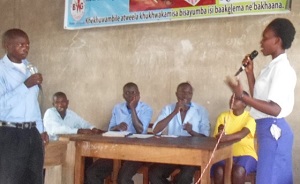Fighting Violence in schools

A recent ActionAid report indicates that the national annual primary school dropout rates for girls in Uganda is at 20% and about four times more in some districts in the northern and eastern parts of the country. Here, early marriages and teenage pregnancies are well above 50% compared to the national average of 25%.
In some Eastern Uganda districts, the school drop-out rate for girls stands at 84% annually compared to the national rate of 20%, while early marriages and pregnancies are over 60% compared to the national average of 25%.
The above statistics are hinged on the prevalent violence against women and girls which is one of the most widespread violations of human rights on the African continent. In schools, it has many manifestations — from the most universally prevalent forms of sexual harassment, to harmful practices such as defilement, rape, indecent touches and intimidation. Other forms of violence in schools are manifest in corporal punishment, bullying, demeaning language that undermines self-esteem leading to psychological abuse, teacher’s unofficial use of students for free labor including assigning girls to perform domestic chores as well as other forms of aggressive or unauthorized behavior that is violent.
These forms of violence and many others have far-reaching consequences, harming students, their families and communities. This limits the benefits of education, causes poor health and psychological trauma.
In response, Better HAG Uganda is partnering with African Women’s Development Fund (AWDF) to reach out to young people in school with messages on fighting violence in schools through debates; using the motion: “Girls Experience More Violence than Boys”. Students take charge of the debates themselves by selecting the Speaker, Time Keeper and Secretary in addition to the main speakers (Panelists). This is usually a very entertaining session, with boys and girls taking to the podium to air out personal views on who experiences more violence in or out of school. Post debate speeches and/or guidance on violence are done by both teachers and Better HAG Uganda after students are entertained by visitors with a short stage play on the intersect between HIV/AIDS and GBV. ‘School Canteen’, a local educative film that seeks to educate (primarily) the girl child on the need to desist from sexual relations while at school is also screened as a wrap-up sub activity during our school programs.
However, it is during the one-on-one counseling sessions that we are able to unearth peculiar violence-related cases from students (especially girls). Using this forum, we have been able to realize scores of sexual harassment going on in schools including on pathways to and from school; the intention of parents to force daughters into marriage and the fact that most of these students have grown up witnessing different forms of violence inflicted on their mothers. The latter has made (especially) boys grow up knowing that such acts are natural as manifested in their arguments during the debates.
Better HAG Uganda envisions the youth as the treasure of the next generation. We believe that young people are the window of hope for changing tomorrow’s course in a spectrum of angles and that if they are empowered, given the right tools and support to do so, then tomorrow is heaven for the next generation to enjoy. Time to act is now because the youth is a critical demographic group whose health and future we cannot afford to gamble with.


